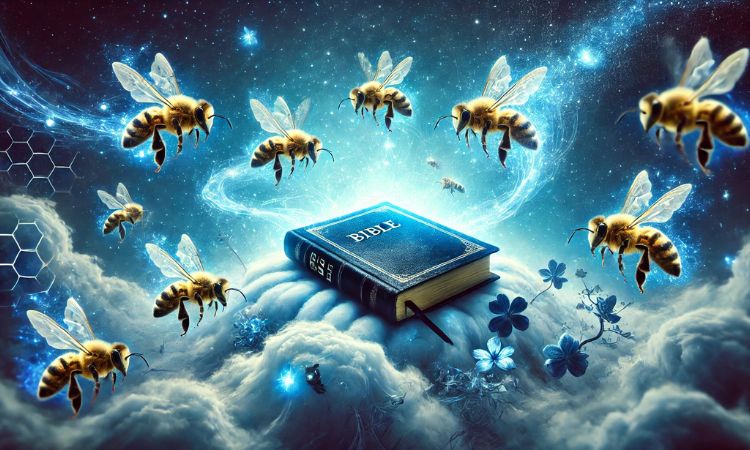Bees hold a unique place in the Bible, symbolizing qualities like diligence, wisdom, and abundance. Their presence is seen in both literal and symbolic contexts, offering valuable insights into spiritual truths. References to bees and honey often highlight the connection between the natural world and divine provision.
The story of Samson, for example, mentions a swarm of bees found in the carcass of a lion, illustrating themes of strength, transformation, and God’s unexpected blessings. Honey, frequently mentioned in the Bible, represents sweetness, nourishment, and the promise of a land flowing with milk and honey.
Understanding the symbolism of bees in the Bible helps connect physical elements of creation with deeper spiritual meanings. Just as bees pollinate plants, supporting life and growth, their biblical significance reflects the importance of productivity, community, and divine order. Recognizing these symbols can offer practical wisdom and a greater appreciation for God’s design woven throughout both scripture and the natural world.

What Are the Biblical References to Bees?
Deuteronomy 1:44 – “And the Amorites, which dwelt in that mountain, came out against you, and chased you, as bees do, and destroyed you in Seir, even unto Hormah.”
- This verse compares the Amorites’ swift and relentless attack to the aggressive nature of a swarm of bees. The imagery highlights both the intensity and persistence of bees when defending their hive, symbolizing determination and collective strength.
Judges 14:7-9 – “And he went down, and talked with the woman; and she pleased Samson well. And after a time he returned to take her, and he turned aside to see the carcass of the lion: and, behold, there was a swarm of bees and honey in the carcass of the lion. And he took thereof in his hands, and went on eating, and came to his father and mother, and he gave them, and they did eat: but he told not them that he had taken the honey out of the carcass of the lion.”
- The story of Samson features a swarm of bees creating honey inside the carcass of a lion, representing unexpected provision and the concept of strength emerging from weakness. The honey symbolizes sweetness and abundance found in unlikely places, reinforcing the idea of divine blessings.
Judges 14:8 – “And after a time he returned to take her, and he turned aside to see the carcass of the lion: and, behold, there was a swarm of bees and honey in the carcass of the lion.”
- This verse reiterates the presence of bees within the lion’s carcass, emphasizing both the significance of the swarm and the honey produced. Bees serve as a reminder of God’s ability to bring forth goodness from difficult situations, while the lion symbolizes strength and power.
Psalm 118:12 – “They compassed me about like bees: they are quenched as the fire of thorns: for in the name of the Lord I will destroy them.”
- The comparison to bees illustrates how enemies can surround and overwhelm, similar to an aggressive swarm. Despite this, the verse conveys the assurance of divine victory, reinforcing the concept of God’s protection against adversity.
Isaiah 7:18 – “And it shall come to pass in that day, that the Lord shall hiss for the fly that is in the uttermost part of the rivers of Egypt, and for the bee that is in the land of Assyria.”
- Here, the bee represents both judgment and control, as God summons these insects to fulfill His purposes. The mention of bees in this context highlights their role as instruments of divine authority, connecting the natural world to God’s sovereign power.
What Is the Symbolism of Bees in the Bible?
In the Bible, bees carry rich symbolic meanings that mirror both their natural behaviors and deeper spiritual truths. Their presence often reflects themes of diligence, community, and divine provision.

Here’s a quick table explaining the biblical symbolism of Honeybees:
| Symbolism | Description |
|---|---|
| Industry and Cooperation | Reflects the diligent and collective nature of bees in producing honey, aligning with biblical teachings on hard work and community. |
| Danger and Aggression | Represents the threat posed by a swarm of bees, symbolizing relentless adversaries. |
| Divine Providence and Abundance | Illustrates God’s ability to bring blessings from unexpected places, as seen in the story of Samson and the lion. |
| Unity and Community | Symbolizes the harmony and cooperation within a beehive, mirroring monastic life and biblical principles of fellowship. |
| Spiritual Growth and Revelation | Represents the sweetness and fulfillment found in spiritual pursuits, echoing the role of honey in the Bible. |
Industry and Cooperation
Bees symbolize industry and cooperation, reflecting their natural behavior of working together within a hive to produce honey. This diligence aligns with biblical teachings that emphasize hard work and collective effort. Although bees are not directly mentioned in Proverbs 6:6-8, the call to observe the industrious ant resonates with the same principle—encouraging individuals to emulate the tireless productivity found in nature.
Danger and Aggression
Bees also represent danger and aggression when provoked. In Deuteronomy 1:44, the Amorites are compared to a swarm of bees, highlighting their relentless and fierce attack. Similarly, Psalm 118:12 uses the imagery of bees surrounding an individual, symbolizing numerous adversaries who press in from all sides. Despite their threat, the verse conveys confidence in God’s deliverance, underscoring the contrast between earthly danger and divine protection.
Divine Providence and Abundance
The story of Samson and the swarm of bees found within the carcass of a lion (Judges 14:8) illustrates divine providence and God’s ability to bring blessings from unexpected places. The honey produced within the lion’s carcass symbolizes abundance, sweetness, and the unexpected ways in which God provides for His people.
This moment leads to Samson’s riddle: “Out of the eater came something to eat, and out of the strong came something sweet”—a reminder that God can create goodness even from difficult circumstances.
Unity and Community
The structure and function of a beehive, with its queen bee and worker bees, symbolize unity and community. Each member of the hive plays a distinct role, contributing to the survival and success of the whole.
This communal harmony is often compared to the organization of monasteries, where monks work together with a shared purpose. Just as bees collaborate within their hive, monastic life reflects the biblical principle of living in fellowship, with each individual contributing to the greater good.
Spiritual Growth and Revelation
Bees also symbolize spiritual growth and revelation. In Revelation 10:9-10, John describes a scroll that tastes as sweet as honey, representing the joy and fulfillment found in embracing God’s Word.
This sweetness reflects the richness and satisfaction that come from spiritual pursuits, echoing the role of honey in the Bible as a symbol of both physical nourishment and divine wisdom. Bees, as pollinators that sustain life, serve as a reminder of the growth and renewal that spiritual truth brings.
What Are the Cultural and Historical Contexts of Honeybees?

Honeybees have played an integral part in various cultures and historical periods, often symbolizing industry, community, and divine provision. Their economic and spiritual significance is evident in ancient Near Eastern cultures, biblical references to the Promised Land, and the beekeeping traditions of monasteries.
Ancient Near Eastern Cultures: Value of Honey and Bees
In ancient Near Eastern societies, honey and bees held significant economic and cultural value. Honey, a rare and expensive sweetener, was used both as a food ingredient and in brewing beer, as well as in magico-medicinal practices. The scarcity of honey in regions like Mesopotamia made it highly prized—historical records indicate that one shekel of silver could purchase only two pounds of honey, while the same amount could buy three hundred liters of dates.
This economic significance underscored the importance of beekeeping, with archaeological evidence from sites like Tel Rehov in Israel revealing large-scale beekeeping practices as far back as the 10th–9th centuries B.C.E. These findings highlight the advanced agricultural techniques of the time and the value placed on honey and beeswax.
The Promised Land: “A Land Flowing with Milk and Honey”
The Bible describes the Promised Land as “a land flowing with milk and honey” (Exodus 3:8, Leviticus 20:24), symbolizing abundance and fertility. This metaphor emphasized the richness of the land, where milk and honey represented the finest agricultural produce.
While the term “honey” often referred to the sweet secretions of fruits like dates and figs, the discovery of ancient beehives suggests that bee honey also held cultural and economic significance. The image of honey as a symbol of abundance resonated deeply within ancient Israelite society, reinforcing the idea that the Promised Land offered both physical sustenance and divine blessing.
Monastic Traditions: Bees in Monasteries and Their Spiritual Significance
In monastic traditions, bees were more than a source of honey and beeswax—they held profound spiritual significance. Monks often practiced beekeeping within monastery grounds, viewing the care of bees as a contemplative act that fostered a deeper connection with the natural world. Beeswax was essential for crafting candles used in religious ceremonies, symbolizing divine light and spiritual illumination.
Additionally, the social structure of bee colonies, with their emphasis on unity and cooperation, served as a metaphor for monastic life, where individuals worked together in service of a shared spiritual purpose. This relationship between monks and bees underscored the belief that harmony with nature was essential to the pursuit of spiritual enlightenment.
What Are the Spiritual Importance of Honeybees?
The spiritual significance of honeybees is multifaceted, reflecting their integral part in both the natural world and religious practices. Their role in pollination, symbolic connections to saints, and the use of beeswax in worship highlight their importance in spiritual life.
Pollination and Divine Work: Bees’ Role in Nature
Honeybees play a crucial role in pollination, often viewed as a form of divine work. By pollinating plants and crops, they contribute to the growth and abundance of the earth, aligning with biblical themes of provision and synergy. This interconnected relationship between bees and the ecosystem mirrors the biblical belief in the harmony of God’s creation.
Historical texts like the Byzantine farming book Geoponika describe bees as “the wisest and cleverest of all animals”, emphasizing their unique role as agents of divine providence. Their pollination work serves as a reminder of how even the smallest creatures contribute to the greater good, reflecting God’s design in the natural world.
Patron Saint of Beekeeping: St. Ambrose
St. Ambrose, the patron saint of beekeepers, represents the spiritual connection between bees and human vocation. According to legend, a swarm of bees landed on his mouth when he was an infant, foreshadowing his future as a gifted orator. This event is seen as a sign of divine intervention, illustrating the concept of predestination—the belief that God guides individuals toward their spiritual calling.
St. Ambrose’s association with bees reinforces the idea that natural phenomena can reveal spiritual truths, emphasizing the interconnectedness of the human and divine. His legacy continues to inspire beekeepers and those seeking a deeper connection with God’s creation.
Holy Beeswax: Use in Christian Worship

Beeswax holds a sacred place in Christian worship, especially in the Catholic Church. Candles made from beeswax are used in religious ceremonies, symbolizing the light of Christ and the presence of the Holy Spirit. The wax represents Christ’s pure flesh, the wick signifies his soul, and the flame embodies his divinity. This symbolism reflects the concept of transubstantiation, where a physical substance is imbued with spiritual meaning.
The use of beeswax candles during liturgical rituals underscores the belief that ordinary elements of the natural world can be transformed into vessels of divine presence, reinforcing the spiritual connection between creation and worship.
Conclusion
The biblical meaning of bees reflects their dual role as symbols of both physical sustenance and spiritual truths. Their presence in scripture illustrates key themes such as diligence, divine provision, and community, offering practical lessons that apply to daily life.
From the swarm found in the lion’s carcass in Samson’s story to references of bees symbolizing both danger and determination, these creatures represent the complex nature of God’s design. Their ability to produce honey in unlikely places serves as a reminder that blessings often emerge from challenges, aligning with the biblical message of strength through faith.
Beyond their scriptural significance, bees also hold spiritual importance through their role in pollination, their connection to St. Ambrose, and the use of beeswax in worship. Together, these aspects highlight how even the smallest creatures reflect divine wisdom, bridging the physical and spiritual worlds.
FAQs
What Does a Swarm of Bees Mean in the Bible?
A swarm of bees in the Bible symbolizes diligence, cooperation, and potential danger. It reflects both the industriousness of bees and the relentless nature of adversaries, as illustrated in Psalm 118:12 and Deuteronomy 1:44, emphasizing perseverance and divine protection during challenges.
What Do Bumble Bees Represent Biblically?
Although not explicitly mentioned in the Bible, bumble bees represent diligence, productivity, and teamwork. Their tireless efforts and cooperative nature symbolize hard work, persistence, and the importance of community, aligning with biblical teachings that encourage industriousness and mutual support.
Are Bees a Symbol of a God?
Bees are not directly symbols of God, but they represent His provision and blessings. Their production of honey, associated with abundance and divine sweetness, reflects God’s care and the richness of His creation, as seen in references to the Promised Land flowing with milk and honey.
What Is the Spiritual Lesson of the Bees?
The spiritual lesson of bees emphasizes diligence, community, and trust in divine provision. Their tireless work and collaborative nature highlight the importance of perseverance, cooperation, and productivity, demonstrating how collective effort and faith in God lead to both material and spiritual growth.






